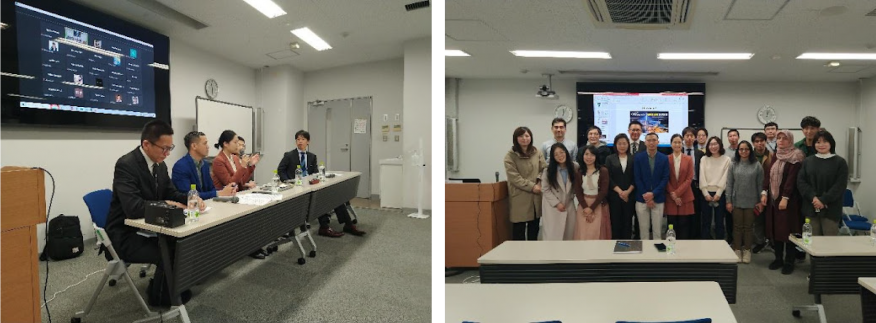Report: Kyoto University School of Public Health International Lecture Future Healthy Ageing Communities Roundtable Discussion
On March 27, 2023, in the morning, an international lecture was held at Kyoto University School of Public Health, on the topic of Future Healthy Ageing Communities. About 10 students and faculty members of Kyoto University attended on-site, and about 30 participants attended via ZOOM, in this international lecture. Two officers from WHO Western Pacific Regional Office (WHO/WPRO), as well as researchers from Brunei and Cambodia were invited as guest speakers for this event. The objective of this lecture was to learn about the Healthy Aging policies and action plans set by WHO/WPRO, as well as country case examples from Brunei and Cambodia.
First, Ms. April Siwon Lee, a technical officer of WHO/WPRO, gave a lecture on the overview of what WHO/WPRO is aiming to achieve through their policies and activities of Healthy Ageing. She emphasized the fact that many of the WHO member states within the Western Pacific region will experience rapid aging of the population in the upcoming years. Therefore, each country needs to come up with sustainable and feasible policies and action plans to promote healthy aging.
Regional Action Plan on Healthy Ageing was endorsed by the WHO/WPRO Member States in October 2020 to adopt a future-oriented, multisectoral, and lifelong approach that adopts an equity lens and encourages the use of existing assets to the extent possible among the WHO member states within the Western Pacific region. This plan consists of the following five objectives:
1) Transforming societies as a whole
2) Transforming health systems
3) Providing community-based integrated care
4) Fostering technological and social innovation
5) Strengthening monitoring and surveillance systems
WHO/WPRO is providing technical support to the member countries which plan to incorporate Healthy Aging policies and practices in their country’s contexts, as well as to foster research to build evidence. They also continue to work on advocacy and knowledge-sharing activities.
Next, Dr. Sovandara Kao of Royal University of Phnom Penh, Cambodia, and Dr. Shyh Poh Teo of RIPAS Hospital, Brunei Darussalam reported the activities of Healthy Aging in Cambodia and Brunei, respectively. The challenges for Cambodia with respect to healthy aging is that Cambodia does not have the national security fund for the elderly. With this given situation, some of the good activities are done by community centers and pagodas, and also family plays an important role in taking care of the elderly in Cambodia. Field testing and monitoring and evaluation of social prescribing activities are gradually taking place in some of the provinces in Cambodia.
In the case of Brunei, the committee is formulated involving multiple ministries and experts to create a harmonized plan to care for the elderly in Brunei. There are some environmental challenges in living conditions for the elderly in Brunei, as there are offshore housings in Brunei, which makes it difficult for elderly with the chronic symptoms who had been hospitalized to go back to their homes in the recovery period. The government planned relocation of those who are living in offshore housing, but the relocation housing is a two-story housing with stairs, which is difficult for the elderly with limitation in walking capacity. With that in mind, Brunei created a guideline for people with different abilities.
During the latter half of the international lecture, there were times for roundtable discussions between the four guest speakers (Ms. April Siwon Lee, Dr. Mikiko Kanda, Dr. Sovandara Kao, and Dr. Shyh Poh Teo) and Prof. Naoki Kondo, a professor of Department of Social Epidemiology in Kyoto University School of Public Health. In this roundtable discussion, challenges in implementing healthy aging activities were discussed. One such topic was how to enhance collaboration among different stakeholders in implementing policies and activities related to healthy aging. The discussants agreed that both top-down and bottom-up approaches are necessary for enabling activities involving different stakeholders.
This international lecture ended by acknowledging the importance of spreading the concepts of healthy aging in the countries in western pacific region, and collaboration is the keywords to expand activities on Healthy Aging.
